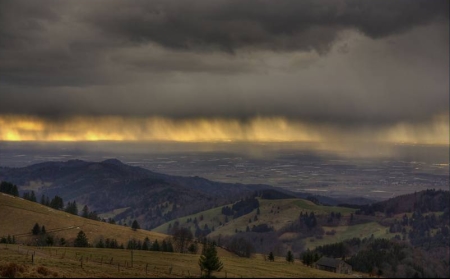Working Group "Regional Climate and Water Cycle", Head Dr. Gerd Schädler
Climate and precipitation - one of the main components of the water cycle - within a region depend on geographical position, topography, soils and prevailing land use. Therefore, they often show a pronounced variability in time and space, even over small distances. It is also often observed that the spatial distribution of extremes differs considerably from the one for average values, e.g. patterns of heavy precipitation differ from the patterns of annual precipitation sums.
Knowledge of the past, present and future behaviour of climate and water cycle on regional scales is essential for climate adaptation and planning issues, and the gaps in our understanding of this multi-component, multi-scale system need to be filled. Numerical models are a suitable tool for these purposes. Our working group is engaged in the modelling, the analysis and the interpretation of the intimately connected topics water and climate on the regional scale with high spatial resolution. We use COSMO-CLM as our regional climate model (RCM) and are a member of the CLM Community.
Specifically, our activities focus on:
- improvement of atmospheric and soil-vegetation models permitting the simulation of regional weather and climate with time spans from days to several decades
- producing ensembles of high-resolution simulations of the recent past, present and future climate for different regions (Central Europe, Germany, Africa); the ensembles are generated using different global models (GCMs), realisations and RCM setups
- validation of the model results, taking into account the uncertainties of the models as well as of the observations
- application of advanced methods to obtain regional climate statistics, especially for extremes, trends and variability on various time scales
- assessment of uncertainties via ensembles
- very high resolution (0.025°) climate simulations for Central Europe
- provision of consistent high-resolution climate data for impact studies
- establishing regional water balances
- regional climate predictions (as opposed to climate projections) with lead times between years and decades
- regional paleoclimate modelling with a focus on ice sheets and water isotopes.
There are various connections to other working groups of the institute through exchange of data, analysis of field experiments, development of methods and model validation activities.
South German Climate Office
We also are closely linked with the South German Climate Office.

